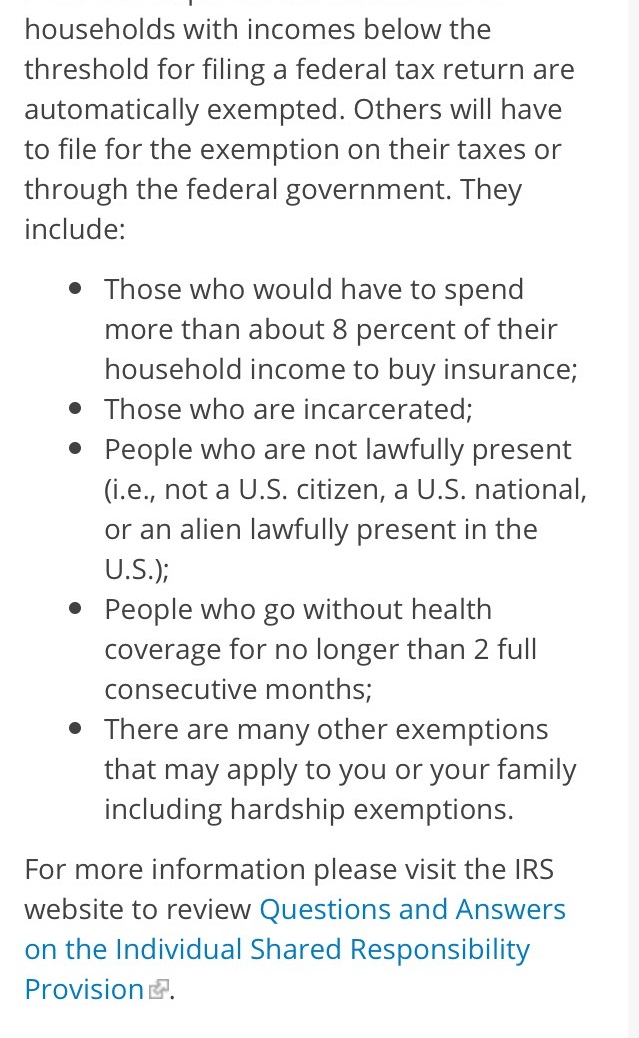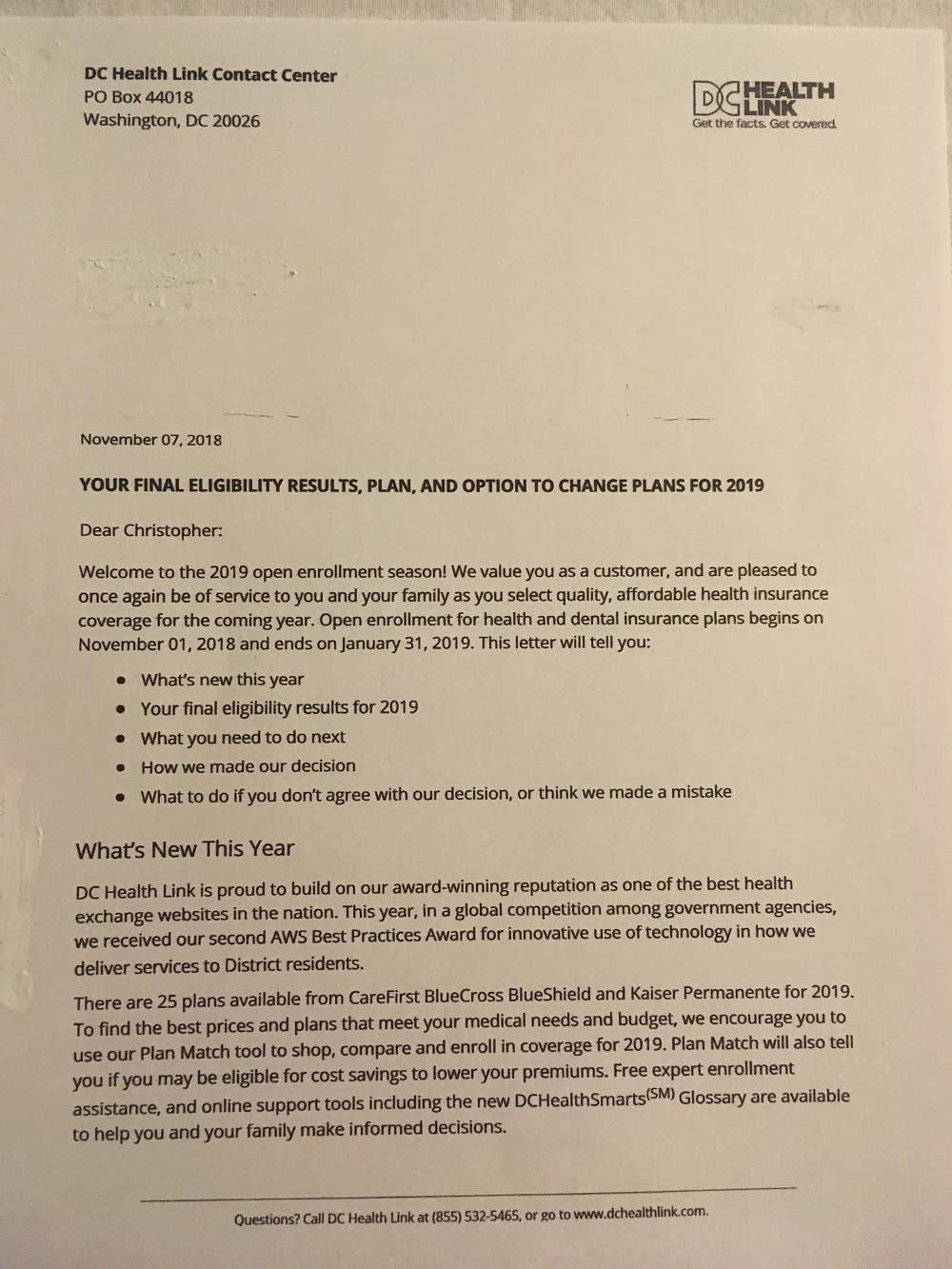Exclusive: D.C. Exchange Website Misled Customers about Individual Mandate
Last year, in response to Congress repealing the Obamacare individual mandate penalty beginning this January, the D.C. Council established its own requirement for District residents to maintain health coverage. If D.C. leaders wished to replicate Obamacare on the local level, they have succeeded beyond their wildest expectations—right down to the non-functioning website.
For nearly six months—including the first month of open enrollment—the District failed to inform visitors to its online insurance exchange about the new coverage requirement. When District officials finally discovered their webpage fail, what did they do to admit their fault, and tell the public? Nothing.
The Webpage Fail, Explained
At the start of the open enrollment period in early November, I went to the District’s health insurance exchange website, D.C. Health Link, to evaluate my coverage options for 2019. While there, I found an intriguing—and misleading—webpage. When discussing whether individuals should purchase coverage, the webpage noted that “federal law requires most Americans to have a minimum level of health coverage,” a requirement that was “still in effect for the 2017 and 2018 tax years.”


By stating that the requirement remained in effect for 2017 and 2018, the webpage implied that the mandate will disappear in 2019. But while the federal penalty disappeared on January 1, the District’s own insurance mandate replaced the federal requirement on that date. However, the webpage I saw did not mention the D.C. mandate at all.
By discussing the expiring federal mandate and not the new D.C. requirement, the webpage I viewed did not just provide misleading statements about the need to maintain coverage in 2019, it contained inaccurate information, too. The webpage noted that the federal mandate did not penalize individuals with short gaps of coverage of under three months—but the District’s stricter law requires individuals to maintain health coverage every single month.
The webpage also directed individuals seeking exemptions from the mandate to apply to federal authorities, even though the D.C. exchange has assumed that role for the District’s mandate, effective January 1.
In fairness, I, and presumably other prior customers, did receive a mailer from D.C. Health Link discussing the District’s new coverage requirement for 2019. However, the mailer did not mention the mandate until the top of its second page—an area where casual readers could easily miss it. Instead, the mailer spent prime real estate on the first page discussing “our award-winning reputation as one of the best health Exchange websites in the nation:”
Which do you think is more important for District residents to know: That the website won some awards, or that if they do not buy “government-approved” coverage, they could have their property seized and sold?
Why District Officials Don’t Care
District officials seem more pre-occupied with bragging about their website than updating their website. For instance, during the November meeting of the D.C. Health Benefit Exchange Authority, no one discussed the flawed webpage about the District’s individual mandate, even though D.C. Health Link staff conducted a presentation for the board explaining the website that showed a link to the flawed webpage.
The November board meeting also showed a video of D.C. Mayor Muriel Bowser’s appearance at the launch event for open enrollment. During that event, Bowser gave remarks claiming that “D.C. Health Link has made navigating its website even easier.” Bowser failed to mention that, even as she spoke, that “easier” website included incorrect, flawed, and misleading information about the individual mandate she had signed into law months previously.
Ignoring the ‘Debacle’
Nearly one month into open enrollment, on November 28, it appears D.C. Health Link finally discovered their error. Officials removed access to the page discussing the expiring federal mandate—the Internet Archive captured the old page—and created a new page discussing the District’s new coverage requirement for 2019.
But did District officials publicly admit that their website included incorrect information, try to inform the public, or make things right with those who viewed that incorrect information? No, no, and no. The Exchange Authority board held their most recent monthly meeting in mid-December, and the incident did not come up at all.
When healthcare.gov famously crashed and burned in 2013, then-Health and Human Services Secretary Kathleen Sebelius publicly accepted responsibility for the website “debacle.” By contrast, Mila Kofman, executive director of the Exchange Authority, apparently wants to pretend that the problems with the website she runs never took place.
Congress Should Fix This Mess
Beyond raising obvious questions of competence, the flawed webpage could have very real consequences for District residents. Any individuals who went to the incorrect webpage during the first month of open enrollment, and used its erroneous information to decide not to purchase health coverage for 2019, will face tax penalties when filing their 2019 returns in April 2020—penalties directly resulting from the bungling of District bureaucrats.
While District officials may try to give individuals who suffered from the incorrect webpage exemptions from the mandate penalty, it does not appear they can do so. The District’s mandate uses the same criteria as the federal one to determine hardship exemptions, namely, whether circumstances “prevented [an individual] from obtaining coverage.”
But in this case, circumstances didn’t prevent individuals from obtaining coverage—they prevented individuals from understanding the consequences of not doing so. D.C. Health Link therefore may not have the authority to solve a problem its own staff caused.
To ensure that no one incurs financial penalties because of the botched exchange website, the D.C. Council—or, better yet, Congress—will have to intervene. They should take the opportunity presented by this affair to repeal the mandate entirely.
Or Congress could use the pending appropriations legislation to include the provisions adopted last summer defunding the District’s mandate. Rep. Gary Palmer (R-AL), who sponsored the defunding amendment last summer, once again offered his amendment earlier this month, when the House considered anew the District of Columbia appropriations measure. Unfortunately, however, the new House Democrat majority refused to make a vote on the amendment in order. This means that, absent additional action, individuals may face sizable tax penalties due to a website mess caused entirely by District officials.
No matter what form it takes, the website mess demonstrates that the District’s insurance mandate should go. Given that D.C. Health Link spends $11 million on IT, yet took six months to update a webpage, it should spend less time ordering District residents to buy insurance and more time getting its own house in order.
This post was originally published at The Federalist.
